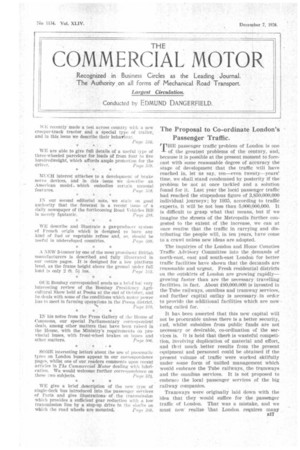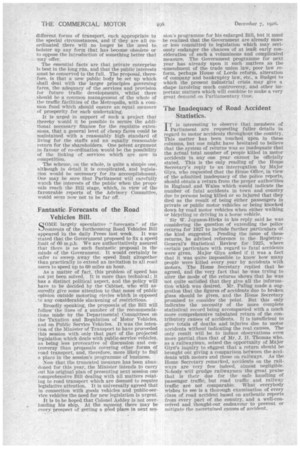The Proposal to Co-ordinate London's Passenger Traffic.
Page 43

Page 44

If you've noticed an error in this article please click here to report it so we can fix it.
rrIHE passenger traffic problem of London is one -L of. the greatest problems of the century, and; because it is possible at the present moment to forecast with some reasonable degree of accuracy the stage of development that the traffic will have reached in, let us say, ten—even twenty—years' time, we shall stand condemned by posterity if theproblem be not at once tackled and a solution found for it. Last year the local passenger traffic had reached the stupendous figUre of 3,850,000,000 individual, journeys ; by 1935, according to traffic experts, it will he not less than 5,000,000,000. It is difficult to grasp what that means, but if we Imagine the streets of the Metropolis further congested to the extent of the increase, we can at once realize that the traffic in carrying and distributing the people will, in ten years, have come to a crawl unless new ideas are adopted.
The inquiries of the London and Home Counties Traffic Advisory Committee into the ,detuands of • north-east, east and south-east London for better traffic facilities have shown that the demands are reasonable and urgent. Fresh residential districts on the outskirts of London are growing rapidly-growing faster titan are the necessary travelling facilities, in fact. About £80,000,000 is invested in the Tube railways, omnibus and tramway services, and further. capital outlay is necessary. in order to provide the additional facilities which are nowbeing called for.
It has been asserted that this new capital will not be procurable unless there is a better security, Faid, whilst subsidies from public funds are not necessary or desirable, co-ordination of the services is. it ts held that therb is wasteful competition, involving duplication of material and effort, and tint nmeh better results from the present equipment and personnel could be obtained if the present volume of traffic were worked skilfully under some form of unified management which would embrace the Tube railways, the tramways and the omnibus services. It is not proposed to embrace the local passenger services of the big railway companies.
Tramways were originally laid down with the idea that they would suffice for the passenger traffic of London. That was a mistake, and we must now realize 'that London requires many
different forms of transport, each appropriate to the special circumstances, and if they are all coordinated there will no longer be the need to bolster up any form that has become obsolete or to oppose the introduction of something better that 'nay offer.
The essential facts are that private enterprise Is best in the long run, and that the public interests must be conserved to the full. The proposal, therefore. is that a new public body be set up which shall deal with the larger principles governing fares, the adequacy of the services and provision for future traffic developments, whilst there should be a common management of the whole of the traffic facilities of the Metropolis, with a common fund which should ensure an equal measure of prosperity for each undertaking.
It is urged in support of such a project that thereby would it be possible to secure the additional necessary finance for the requisite extensions, that a general level of cheap fares could be maintained with a reasonably high standard of living for the staffs and an equally reasonable return for the shareholders. One potent argument in favour of co-ordination would be the possibility of the linking of services which are now in competition.
The scheme, on the whole, is quite a simple one, although in detail it is complicated, and legislation would be necessary for its accomplishment. One may be sure that Parliament will carefully watch the interests of the public when the proposals reach the Bill stage, which, in view of the favourable reports of. the Advisory Committee, would seem now not to be far off.
Fantastic Forecasts of the Road Vehicles Bill.
SOME largely speculative " forecasts " of the contents of the forthcoming Road Vehicles Bill appeared in the daily Press last week. It was " stated that the Government proposed to fix a speed limit of 60 m.p.h. We are authoritatively assured that there is no such fantastic proposal in the minds of the Government. It would certainly be safer to sweep away the speed limit altogether than practically to extend an invitation to all road users to speed up to 60 miles an hour.
As a matter of fact, this problem of speed has not yet been solved, It is more than technical ; it has a distinct political aspect, and the policy will have to be decided by the Cabinet, who will assuredly give some attention to that mass of public opinion outside motoring circles which is opposed _ 1 o any considerable slackening of restrictions.
Broadly speaking, the proposals of the Bill will follow the lines of a number of the recommendations made by the Departmental Committees on the Taxation and Regulation of Motor Vehicles, and on Public Service Vehicles. It was the intention of the Minister of Transport to have proceeded this session with only that part of the projected legislation which deals with public-service vehicles, as being less provocative of discussion and controversy than proposals covering other forms of road transport, and, therefore, more likely to find a place in the session's programme of business.
Now that the truncated measure has been abandoned for this year, the Minister intends to carry out his original plan of presenting next session one comprehensive Bill dealing with all matters relating to road transport which are deemed to require legislative attention. It is universally agreed that in connection with goods vehicles and public-service vehicles the need for new legislation is urgent.
It is to be hoped that Colonel Ashley is not over loading his ship. At the moment there may he every prospect of getting a good place In next sea., ,
sion's programme for his enlarged Bill, but it must be realized that the Government are already more or less committed to legislation which may seriously endanger the chances of at leagt early consideration of such a voluminous and complicated measure. The Government programme for next year has already upon it such matters as the amendment of the trade union law, poor law reform, perhaps House of Lords reform, alteration of company and bankruptcy law, etc., a Budget to which the present industrial crisis may give a shape involving much controversy, and other important matters which will combine to make a very great demand on Parliamentary time.
The Inadequacy of Road Accident Statistics.
TT is interesting to observe that members of 1 Parliament are requesting fuller details in regard to motor accidents throughout the country. This matter has been touched upon in these columns, but one might have hesitated to believe that the system of returns was so inadequate that the actual total number of people killed in motor accidents in any one year cannot be officially stated. This is the only reading of the Home Secretary's reply to an interrogation by Major Glyn, who requested that the Home Office, in view of the admitted inadequacy of the police reports, should obtain a return from the proper authorities in England and Wales which would indicate the number of fatal accidents in town and country due to persons being killed or so injured that they died as the result of being either passengers in private or public motor vehicles or being knocked down by road motor vehicles when either walking or bicycling or driving in a horse vehicle.
Sir W. Joynson-Hicks in his reply said he was considering the question of extending the police returns for 1927 to include further particulars of the kind suggested. Pending the issue of these returns, he advised reference to the RegistrarGeneral's Statistical Review for 1925, where certain particulars with regard to fatal accidents were given. Major Glyn asked if it was a fact that it was quite impossible to know how many people were killed every year by accidents with motors. The Home Secretary replied that he agreed, and the very fact that he was trying to alter the mode of the returns shows that he was not quite satisfied that they give all the information which was desired. Mr. Paling made a suggestion that the figures of accidents due to broken glass should be given, and the Home Secretary promised to consider the point. But this only indicates the necessity of the more complete statistical record being accompanied with a much more comprehensive tabulated return of the contributory causes of accidents. It is insufficient to give totals of deaths and injuries due to motor accidents without indicating the real causes. The only result will be to induce observations even more partial than that of Mr. J. II. Thomas who. as a railwayman, seized the opportunity of Major Glyrt's inquiry to sftggest that a return should be brought out giving a comparison between the accidents with motors and those on railways. As the Home Secretary remarked, accidents on the railways are very few indeed, almost negligible. Nobody will grudge railwaymen the great praise that is their due for the safe handling of passenger traffic, but road traffic and railway traffic are not comparable. What everybody wishes to see is a thorough examination of every class of road accident based on authentic reports from every part of the country, and a well-conceived and thought-out endeavour to prevent or mitigate the ascertained causes of accident.




















































































































